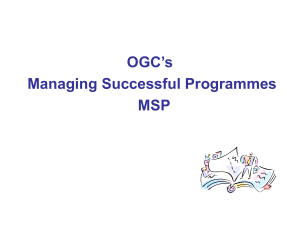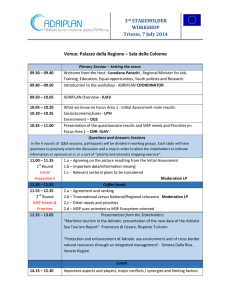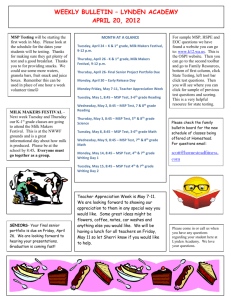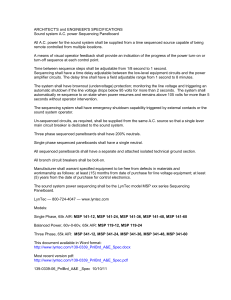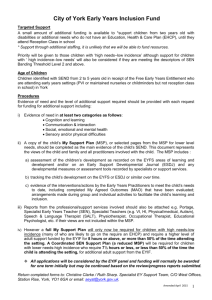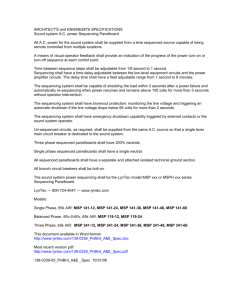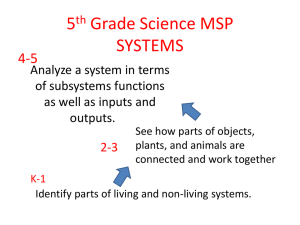MUNCHAUSEN SYNDROME BY SYNDROME BY PROXY
advertisement
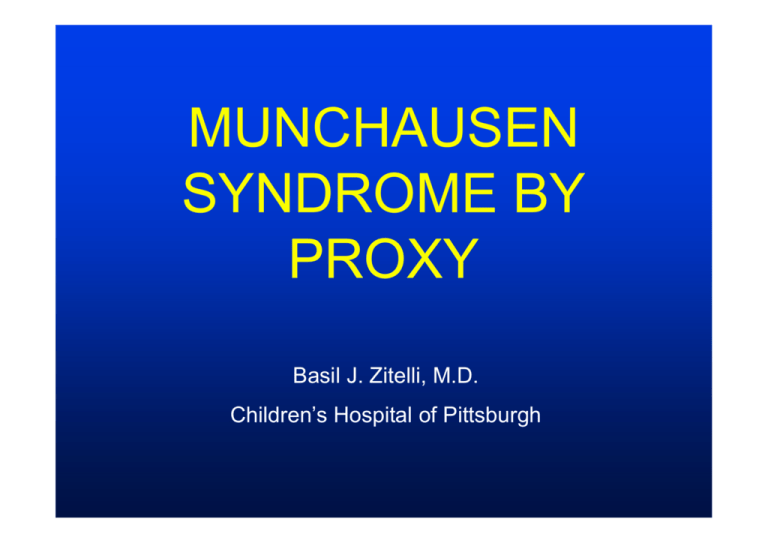
MUNCHAUSEN SYNDROME BY PROXY Basil J. Zitelli, M.D. Children’s Hospital of Pittsburgh Hieronymus Karl Friedrich Freiherr von Munchausen Born May 11, 1720 Bodenwerder, Germany • 1951 Richard Asher described Munchausen Syndrome • 1977 Roy Meadow extended the d description i ti tto MSP 8 week old infant with recurrent upper respiratory tract bleeding and apnea Multiple evaluations and procedures including nuclear scanning with 51Cr erythrocytes Bleeding episode occurred shortly after admission to JHH with blood on the face and pillow Background 417 cts/10 min. Blood from face 449 Patient’s Patient s capillary blood 8921 Infant’s blood type Face blood Mother Father A A A A Cc cc cc Cc MSP - A malignant form of child abuse • Factitious illness, simulated or induced y someone in loco p parentis by • Repeated medical evaluations • Denial D i l off kknowledge l d off th the etiology ti l b by parent • Signs and symptoms abate when the child is separated from the perpetrator DSM IV - Factitious illness by proxy • Intentional production of physical or psychological signs or symptoms while under under the individual’s care • Motivation - assume the sick role by proxy • No external incentives • Not explained by any other mental disorder Definitional Issues in MSP 1996 Task Force MSP - both pediatric and psychiatric entities a. focus on child victimization – Pediatric Condition Falsification b. parent’s parent s psychiatric disorder – Factitious Disorder by Proxy MSP – Two Components Child Victim – Pediatric Condition Falsification ( (PCF) ) Adult falsifies physical signs and/or symptoms in a victim, causing victims to be regarded g as ill / impaired p MSP – Two Components p (PCF) ( ) Falsification includes: 1) directly di tl causing i conditions diti 2)) over or under reporting p g signs g or symptoms 3) creating false appearance of signs and symptoms 4) coaching the victim or others to misrepresent the victim as ill MSP – Two Components The perpetrator – Factitious Disorder by Proxy (FDP) Persons who intentionally falsify a history, signs or symptoms in a child to meet their own self-serving self serving psychologic needs MSP – Two Components p (FDP) ( ) Types of self-serving psychologic needs: 1)) The need to be p perceived as devoted p parent 2) The need to covertly control, manipulate or deceive authority figures 3) External incentives in FDP may be present, but they are not the primary motivation for the MSP behavior Conditions which mayy be confused with PCF or FDP Falsification of sexual abuse for primary purpose of obtaining custody or harming the spouse Help-seekers: Help seekers: overwhelmed parents who falsify symptoms to get help for their child Lying to avoid classical abuse Overanxious parents MSP It is only when the perpetrator’s motivation involves self-serving psychological needs that MSP should be considered ((difficult to make such distinctions in reality) y) Spectrum p of Parental Actions neglect, nonignoring compliance symptoms normal over-anxious (PCF/ FDP) inducer active inducer MSP simulator Child abuse in the United States • > 903,000 children in US maltreated 515,000 neglected 172 000 physically abused 172,000 90,300 sexually abused 63,000 psychologically abused 1300 die from injuries • MSP ??? MSP - Epidemiology MSP - unknown incidence, not a rare disorder - 700 cases reported in 20 yr Schreier surveyed nephrologists and gastroenterologist # responses to questionnaire = 316 # reported case contact = 210 # cases confirmed or seriously suspicious=465 CHP - 16 year survey, 140,000 admissions, no cases MSP codes in medical records, yet at least five recollected Rosenberg (1987) • • • • 117 cases from the literature Males = females Age at diagnosis 39.8 months Time from onset to diagnosis 14 14.9 9 mo Rosenberg g (con’t) ( ) • 25% simulated i l t d ill illness 72% of episodes occurred in hospital • 50% induced 95% of episodes occurred in hospital • 25% both simulated and induced 89% of episodes occurred in hospital Rosenberg (con’t) (con t) The perpetrator: 98% biological mother 2% adoptive mother 1.5% paternal collusion Unusual that father is perpetrator McClure, cC u e, 1996 996 128 children in 2 yr yr, MSP MSP, poisoning or suffocation 1) median age = 20 months 2) 47% male, 53% female 3) Mother as perpetrator 85% Father as perpetrator 6/128 (5%) McClure, cC u e, 1996 996 4) 77% < 5 yr of age 5) 55 MSP alone, 26 poisoning and MSP, 15 poisoning alone, 15 suffocation alone, 14 suffocation and MSP, 1suffocation and poisoning poisoning, 2 all three 6) 119/128 (93%) inappropriate invasive tests or treatments 7) 68 (53%) suffered severe illness illness, and 8/128 deaths (6%) McClure, cC u e, 1996 996 Incidence: <16 yr= 0.5/100,000 <1 yr = 2.8/100,000 Estimated 600 new cases per year of MSP / suffocation / poisoning in the USA The Perpetration • Impressive medical histories • Many physicians, many subspecialists • Bleeding, Bleeding seizures, seizures CNS depression depression, apnea, diarrhea, vomiting, fever, rash, h hematuria, t i glycosuria, l i CF CF, bi biochemical h i l chaos, recurrent infections, weakness, renal calculi, abuse ... The Perpetration (con’t) • 100% of children suffered short term morbidity • 75% suffered at the hands of both mother and the medical staff • 25% suffered ff d only l att th the h hands d off th the medical staff The Family Unit • Parents live together • Father employed but distant from the family, unaware of the fabrication The Victim • Excessive use of medical facilities • Infants and toddlers at highest risk – 10 /17 deaths occurred in children <3 yrs • Persistent / recurrent illnesses that cannot be explained, don’t don t make sense, or are bizarre • Older Old children hild d drawn iinto t symbiotic bi ti relationship, participate in fabrication Co-morbidity y • 73% off victims i ti h had d other th ffabricated bi t d illnesses – 29% FTT – 29% non-accidental non accidental injury injury, neglect neglect, or medicated – 64% other fabrications Siblings Sibli • 39% also victims of fabricated illness – 17% h had d FTT FTT, iinjury j or neglect, l t or medicated – Many sibling deaths are medically inconclusive McClure, cC u e, 1996 996 83 / 128 had siblings g 34 patients ti t h had d siblings ibli who h were abused, 15 patients had siblings who died previously (18 sibling deaths, 5 categorized as SIDS) The Mother • Age 29, married, articulate • 31% have some exposure to the medical profession • 25% - 60% h have hi history t off possible ibl Munchausen syndrome • 50% have had symptoms similar to their child in the past three years The Mother - Desirable Traits • • • • Spends time on the medical units Becomes friendl friendly with ith the medical staff Participates p in child’s care Remains calm despite child’s serious illness • Compliments staff, consoles doctors Motivation - ??? • Lonely or unwanted as children • Need N d tto assume th the sick i k role l b by proxy – Dehumanizes the child, uses child as an object to fulfill needs – Enters perverse relationship with doctors and staff • Conscious actions - not in a dissociative state • Imposturing of good mothering • Secondary gain - custody, draw father closer, avoid abusive situations • Depression, personality disorders, compulsive Fathers as Perpetrators • 15 fathers, 16 abused children, 11 deaths • Avg intelligence • Schooled, 2 had further education • Few with regular or long-term jobs • 6 had prior psychiatric encounters • 5 had Munchausen Syndrome Fathers as Perpetrators • Lost tempers easily • Other features: fires, unusual pet deaths • Attempts at “hero” stories Fathers as Perpetrators • Marked gender disparity not seen in other forms of child abuse • Father likely to have Munchausen or somatization • High incidence of child deaths • Maternal passivity, inadequacy, etc allows paternal abuse to continue • Psychosocial P h i l ffactors t diff differentt b between t men and women perpetrators Th Professionals The P f i l • Doctors - self-doubt, drawn into web of complicity complicit • Nurses befriend mother • Psychiatrists not familiar with MSP find nothing wrong • Legal staff is not familiar with MSP and doubt it can happen O t Outcome off MSP • 17 /117 children died (15%) • 10 /17 deaths in children <3 yrs • 2 /10 children died after parents had been confronted but children were returned home • Families with more than 1 child victimized are at higher g risk - 4 /13 children died – High incidence of maternal psychiatric illness marital difficulties illness, difficulties, Munchausen syndrome in mothers Follow - up • 49% had poor outcomes outcomes, especially if returned to the mother (continued f b i t d ill fabricated illness, conduct d t and d emotional disorders) • Feeding difficulties, withdrawal, hysterical disorders disorders, Munchausen syndrome • Fear F off parents Long - Term Follow-up (Libow 1995) • • • • 10 adults adults, 33 33-71 71 years of age Felt unloved and unsafe as children Emotional, physical problems as child I Insecure, reality lit testing t ti issues, i avoids id medical care, stress symptoms • Anger to mother, sympathy for father • Some continued fabricating illness Warning Signs • Unexplained Unexplained, extraordinary illness • In congruous signs, symptoms when mother is present • Ineffective treatment • Numerous alleged allergies • Inappropriate maternal affect • Numerous family medical problems or SIDS • • • • • Management Cessation of unnecessary medical tests The physician must not become part of the pathological process Balance delay in confrontation with risk to the child Confirm historical events with eyewitnesses Examine temporal relationship of events with presence of mother Management (con (con’t) t) • • • • • • Examine mother’s history Interview other family members Look for a motive Document meticulously Perform toxicological examinations Type and match blood samples with child and parents Management (con’t) • Separate child and parents • Notify child protection agencies • Increase surveillance Covert Video Surveillance • Southall – 33/39 abuse recorded: suffocation, ff ti fracture, f t poisoning, i i emotional/physical abuse • Hall – 23/41 recorded abuse: – CVS required q to make the dx 13/23 – Supportive of dx 5/23 – Not needed to make dx 5/23 – CVS exonerated 4 families Objections to CVS • CVS uses deception • Parents have reasonable expectation of privacy • Should be able to obtain a warrant • No consent for CVS • Medicine should not engage in police functions • CVS erodes trust in medicine In Favor of CVS • Expectation of doctors to do what is necessary to make a diagnosis • Physicians serve as child advocate • CVS may exonerate families • CVS may prevent parent/child separation ti In Favor of CVS • If parent found to be abusive, can then help child and parent • No reasonable expectation of privacy in hospital • CVS iis di diagnostic, ti nott police li ttooll • CVS noninvasive, consent defeats purpose of the diagnostic tool Confrontation • Summarize differential diagnosis • Summarize S mmari e e evidence idence for factitio factitious s illness • Assume nonaccusatory role • The child must be protected Psychiatric Intervention of MSP • 13 selected cases underwent intense psychiatric inpatient treatment. • 10/13 were reunited after 7 7.5 5 weeks weeks, 3 children were placed out of the home • 1/10 continued ti d with ith ffabricated b i t d ill illness, 1/10 had continuing parent-child difficulties Psychotherapy • 15% of mothers admit to their actions • Obstacles to therapy – Denial – Lack L k off commitment it t to t therapy th – Refusal to submit to therapy – Long - term therapy required • Often described as “untreatable” untreatable Disposition of the Child • Separation from the mother and family – Mother may manipulate family family, continue with fabrication – Poorer P outcome t with ith ffamily il members b • Reunite only y after successful therapy py and close follow - up Legal Considerations • Every state mandates reporting of child abuse – Always discuss this as abuse – do not fall into the trap of defining MSP • Document!!! – Review all medical records meticulously – especially nurses’ notes • Educate – – – – Social service Child protection agencies P Psychiatrists hi t i t Attorneys Legal Decisions in MSP • P People l v Philli Phillips (Cal (C l 1981) - Recognized R i d MSP as child abuse and mental disorder, allowed ll d psychiatric hi t i ttestimony ti b based d on medical literature • In re Jessica Z (NY 1987) - res ipsa loquitur (the case speaks for itself) • Place v Place (NH 1987) - Psychologically unstable p parent is an unfit p parent • Burdeau v McDowell (Supreme Court 1921) Evidence may be used if collected by hospital (includes video) Summary • MSP is child abuse with high morbidity and mortality t lit • Mothers suffer from compulsion for fabrication; personality disorders y must observe for warning g signs, g , • Physicians not participate in abuse Confrontation separation, separation protection • Confrontation, • Psychotherapy • Educate Ed t and d offer ff recommendations d ti ffor legal l l professionals POSTSCRIPT OS SC

